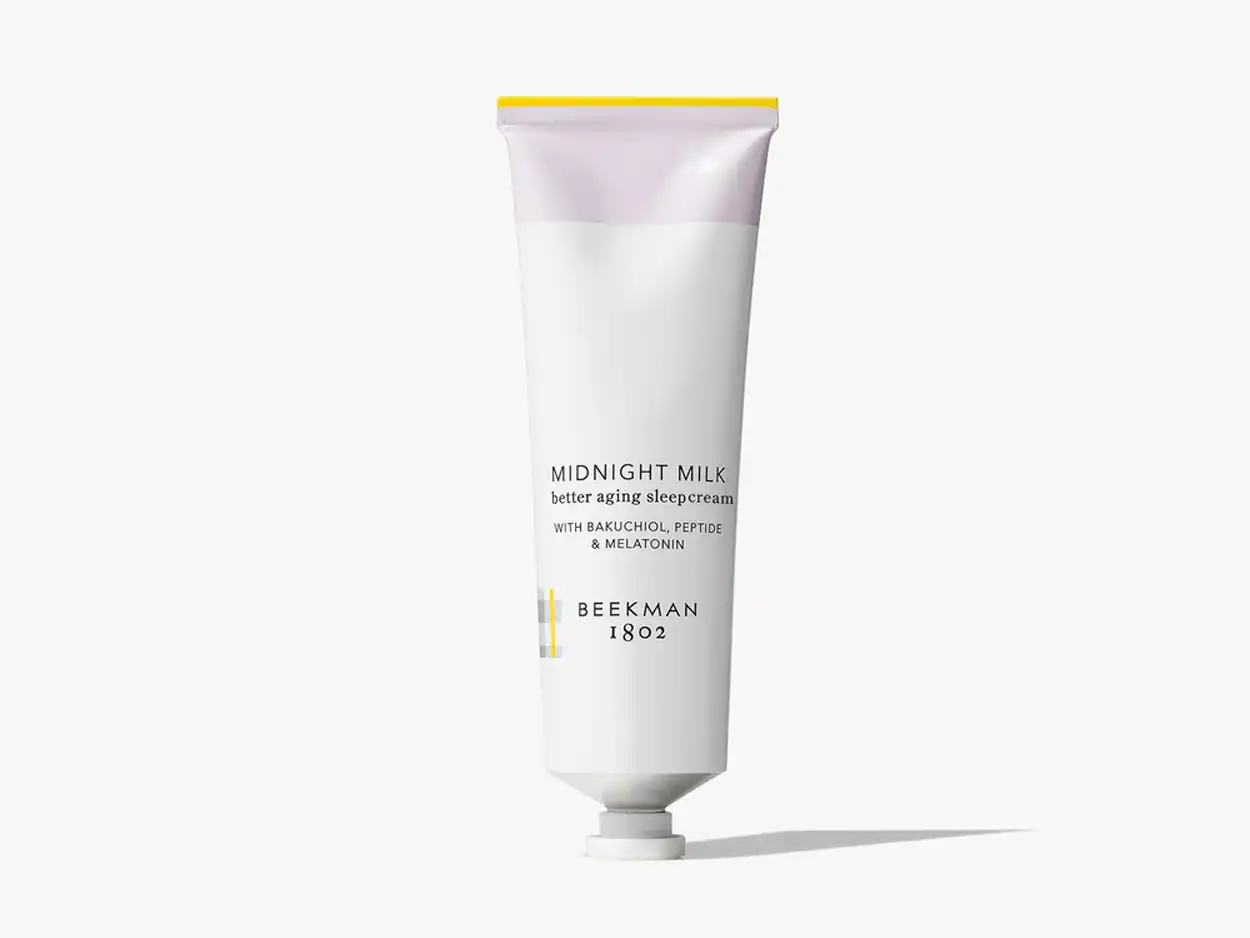Beekman 1802 might be on your radar already if you’re truly passionate about skincare, but for some, it can be an under-the-radar gem. They’ve dubbed their overnight cream “Midnight Milk,” which sounds both cozy and luxurious at the same time. The brand describes it as a peptide-rich formula that aims to hydrate, lift, and tighten skin overnight while also nourishing the skin’s microbiome, sounds pretty ambitious, right?
I spent a full week using this cream every night to see if it could really live up to the hype. From the goat milk and peptides to the addition of bakuchiol and melatonin, there’s a lot going on in this jar. What’s left to find out is whether it’s worth that extra step in your nighttime routine and the money in your wallet.
Disclaimer: This review is not paid or sponsored, and all opinions here are genuinely my own. Please remember that individual skincare results can vary, so what works (or doesn’t) for me may be different for others.
What Is Midnight Milk?
Midnight Milk is an overnight cream from Beekman 1802, formulated with peptides, goat milk, and a handful of gentle actives. This type of night cream is meant to work while you sleep, when the skin is more receptive to repair and hydration. The goal is to give the skin a boost in firmness, minimize visible signs of aging, and help maintain a healthy skin barrier.
The formula focuses on delivering moisture and supporting collagen production, using ingredients like goat milk and plumping peptides. It also contains bakuchiol, which is often considered a gentler alternative to retinol, and melatonin, added to help improve skin tone and texture. While night creams in general are all about giving your skin a chance to recover and recharge, this one also emphasizes nurturing the skin’s microbiome for overall balance.
Did It Work?
I set aside my usual night cream for a few days (a highly scientific act on my part) just to make sure Midnight Milk could truly shine on its own. For each of the seven nights, I applied a small, pea-sized amount of the cream after cleansing and using my toner. From the get-go, the texture felt luxurious, rich but not suffocating, which was a pleasant surprise given how thick some overnight creams can be.
The first two nights, I woke up noticing my skin looked a bit more refreshed, although the effect was subtle. By the fourth or fifth night, I felt the cream’s hydrating benefits were more pronounced: my cheeks felt smoother and slightly firmer around the jawline. It also seemed to keep redness at bay, which was impressive because my skin can be finicky if it doesn’t get enough moisture or if a product is too harsh.
Heading into the final stretch of the week, I did start to see a mild improvement in overall tone, nothing major, but the extra radiance was there in the mirror. It lived up to its assurance of plumping and nourishment, and I appreciated how it never made my skin feel overly greasy. However, while it definitely provided a nice overnight boost, I didn’t experience the dramatic transformation I hoped for. It checked many boxes for a solid night cream, but maybe not enough for me to completely swap out my go-to product long term.
In the end, it did a decent job at hydrating and keeping my skin balanced, all while feeling calm and mild. Although it delivered on some key promises of improved texture and firmness, I still haven’t fallen head over heels in love with it. It’s very close to landing a spot in my nightly lineup, but for now, I’ll stick to my current staples and keep Midnight Milk in mind as a respectable contender should I want an extra skincare treat.
Midnight Milk’s Main Ingredients Explained
The first standout ingredient here is goat milk, an excellent source of vitamins, fatty acids, and minerals. It has natural moisturizing properties that help support a healthy skin barrier and maintain a balanced microbiome. Because goat milk is an animal-derived ingredient, it means this product isn’t strictly vegan-friendly, though it can fit into a vegetarian routine if you’re comfortable using dairy.
Peptides are another key component, specifically palmitoyl tripeptide-38 and acetyl hexapeptide-8, which work to stimulate collagen production and encourage a firmer, smoother complexion over time. Squalane in the formula adds lightweight hydration; it’s known for being non-comedogenic, which means it shouldn’t clog pores.
Bakuchiol is often touted as a gentler alternative to retinol, and here it’s paired with melatonin to improve skin tone and texture without the irritation you might get from stronger actives. A handful of soothing extracts like Centella Asiatica and spinach leaf also help keep redness in check and nourish the skin.
As for potential comedogenic risks (ingredients that could block pores and lead to breakouts), none of the main actives or hydrators are typically flagged as major culprits. Some individuals do find cetyl alcohol a bit heavy, but generally it’s considered low on the comedogenic scale. If there are any further concerns, it’s best to do a patch test on a small area first.
Overall, the ingredient list is formulated to balance gentle yet effective actives with a rich, creamy texture. It offers something for those looking to boost hydration levels and address early signs of aging without using harsh chemicals. The goat milk alone makes it special, but it also means it may not fit everyone’s ethical criteria, still, it stands out if you want a multitasking overnight cream that leans on natural components to yield results.
What I Liked/Didn’t Like
After a solid week of use, here are the points that stood out to me:
What Works Well:
- Rich but lightweight texture that absorbs easily without leaving a greasy feel
- Soothing formula that may help keep redness and irritation in check
- Noticeable boost in overnight hydration, especially around the cheeks
- Minor improvement in skin firmness and tone over continuous nightly use
What to Consider:
- Requires consistent use to see meaningful results, rather than a dramatic change
- Might be an investment for those on a strict budget
- Goat milk base may not fit everyone’s skincare or ethical preferences
- Results could be underwhelming if you’re looking for a pronounced anti-aging effect
My Final Thoughts
Midnight Milk certainly puts forth plenty of lofty promises, plumper skin, boosted hydration, and a calmer complexion so you can practically greet the day camera-ready. While I didn’t wake up feeling like I’d been photoshopped in my sleep, the cream still delivered a decent level of nourishment that left my skin softer and somewhat firmer. Finding a nighttime moisturizer that truly addresses multiple concerns can be an uphill battle, and this formula scores a point or two for showing up and actually doing its job. With a fair stint of experience using other night creams, I gave Midnight Milk a practically unbiased spotlight. My verdict: it’s a solid 7.5 out of 10, and I’d cautiously suggest it to a friend, especially one who values a gentle approach and the allure of goat milk in their skincare.
If you’re on the fence but still love the idea of an overnight cream that targets multiple concerns, there are a few honorable mentions worth exploring. Nocturnal Revive Cream from Deascal is a great all-arounder, more wallet-friendly, and suits all skin types without complicating your nighttime ritual. For those who like a bit of skin-calming action along with hydration, the Cica Sleeping Mask by LANEIGE is a comfortable option that leaves irritation behind. And if you’re looking for something with a long-term focus on smoothness, Revitalizing Supreme+ Night Intensive Restorative Crème by Estée Lauder might fit the bill, it’s rich but surprisingly light on the skin, making it worth a try.
Before you dive in to any new night cream, keep in mind that your skin’s tolerance is unique. Start with a patch test, pay attention to how your skin adjusts, and remember that any improvements you see aren’t going to be permanent unless you make this (or whichever product wins your heart) a consistent part of your routine.

